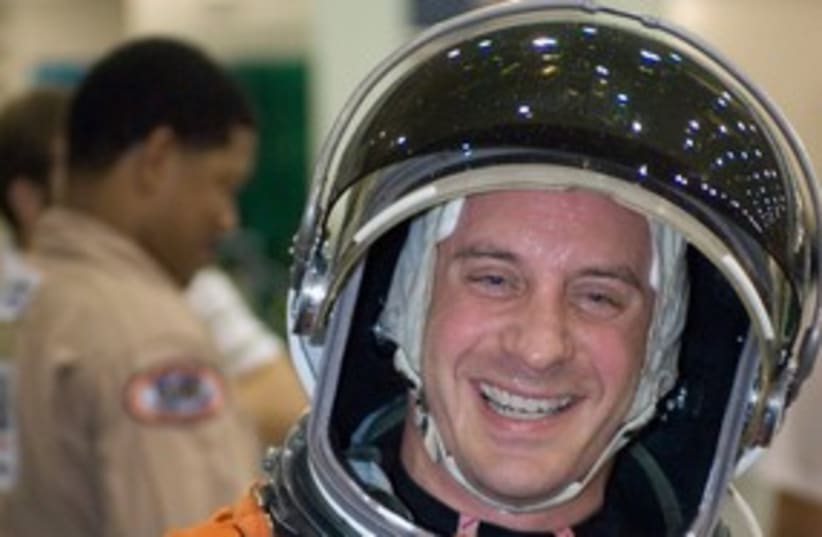Where (almost) no Jew has gone before
Astronaut Garret Reisman charms audience at Jewish Federation of North America’s General Assembly with stories of space mezuzahs.
By GIL STERN STERN SHEFLER
NEW ORLEANS – Garrett Reisman is a Jewish pioneer. No, he doesn’t grow cucumbers on a kibbutz in the Negev. His frontier is space and his mission is to boldly go where no Jew has gone before, or at least very few.“I’m the first Jew to have been on the International Space Station,” Reisman, 42, said at the Jewish Federation of North America’s General Assembly on Monday. He was a guest of Limmud FSU, an organization dedicated to promoting Jewish education among Russian-speakers.RELATED:New Orleans GA to show Jewish role in rehabilitating city“It’s very hard to break records in space today. Yuri Gagarin, first man in space, it’s been done. First man on the moon, Neil Armstrong, been done. The first Jew in space, that’s been done long ago [Boris Volynov in 1969]. So all I have is this: the first Jewish crew member on the international space station, and I brought with me a mezuza.”Reisman’s self-deprecating sense humor hides the magnitude of his achievement. In all, the Morristown, New Jersey-born engineer spent nearly four months in space on two missions.On the way he endured strenuous physical training, had to master sophisticated space technology and even learned to speak Russian.As a speaker of the language of Alexander Pushkin and Fyodor Dostoyevsky (he learned it over six weeks staying with a Russian family), he was invited to give a lecture at a Limmud FSU event in New York City last summer. It was such a success that he was asked by the organization to return for the GA.  Click for full Jpost coverage of the GA 2010Reisman’s ties with Israel run deep, especially after the death of his colleague and friend Israeli astronaut Col. Ilan Ramon. After the Columbia’s illfated mission in 2003 which cost Ramon and his fellow crew members their lives, Reisman became a friend and mentor to Ramon’s son Asaf. He taught him how to fly a plane.Capt. Asaf Ramon, 21, died when his Israel Air Force F-16 crashed in the Judean Desert in 2009.“I was preparing to go on a retreat in Utah and I received a phone call telling me Asaf had been killed in a training incident,” an emotional Reisman recalled. “I got to the airport in Houston and told my crew members, ‘Sorry, I can’t go with you.’ I went to the international terminal and within 24 hours I was able to be in Israel for the funeral.”The two-time space veteran is at a crossroads in his career. The retirement of NASA’s shuttles, whose operational lives were prolonged decades longer than they were intended to last, means the chances of him returning to space have narrowed.Until he reaches a decision on what comes next, he always has the stories of his experiences in space to think about. Like the time he was interviewed on The Colbert Report, the Comedy Central show hosted by fake conservative news pundit Stephen Colbert, from the International Space Station; or the time he called President Shimon Peres long, long distance from above.“In 2008, I was in space on the 60th anniversary of the State of Israel,” Reisman told the crowd here. “I called down with greetings for the event to President Peres and he was quoted as saying he received accolades and greetings from heads of states all over the world – including the president of the United States and Queen Elizabeth II. But he said what really affected him the most were the greetings he got from the Jewish astronaut on the space station. Take that, queen!”
if(catID != 151){
var cont = `Take Israel home with the new
Jerusalem Post Store
Click for full Jpost coverage of the GA 2010Reisman’s ties with Israel run deep, especially after the death of his colleague and friend Israeli astronaut Col. Ilan Ramon. After the Columbia’s illfated mission in 2003 which cost Ramon and his fellow crew members their lives, Reisman became a friend and mentor to Ramon’s son Asaf. He taught him how to fly a plane.Capt. Asaf Ramon, 21, died when his Israel Air Force F-16 crashed in the Judean Desert in 2009.“I was preparing to go on a retreat in Utah and I received a phone call telling me Asaf had been killed in a training incident,” an emotional Reisman recalled. “I got to the airport in Houston and told my crew members, ‘Sorry, I can’t go with you.’ I went to the international terminal and within 24 hours I was able to be in Israel for the funeral.”The two-time space veteran is at a crossroads in his career. The retirement of NASA’s shuttles, whose operational lives were prolonged decades longer than they were intended to last, means the chances of him returning to space have narrowed.Until he reaches a decision on what comes next, he always has the stories of his experiences in space to think about. Like the time he was interviewed on The Colbert Report, the Comedy Central show hosted by fake conservative news pundit Stephen Colbert, from the International Space Station; or the time he called President Shimon Peres long, long distance from above.“In 2008, I was in space on the 60th anniversary of the State of Israel,” Reisman told the crowd here. “I called down with greetings for the event to President Peres and he was quoted as saying he received accolades and greetings from heads of states all over the world – including the president of the United States and Queen Elizabeth II. But he said what really affected him the most were the greetings he got from the Jewish astronaut on the space station. Take that, queen!”
if(catID != 151){
var cont = `Take Israel home with the new
Jerusalem Post Store
Shop now >>
`;
document.getElementById("linkPremium").innerHTML = cont;
var divWithLink = document.getElementById("premium-link");
if(divWithLink !== null && divWithLink !== 'undefined')
{
divWithLink.style.border = "solid 1px #cb0f3e";
divWithLink.style.textAlign = "center";
divWithLink.style.marginBottom = "40px";
divWithLink.style.marginTop = "40px";
divWithLink.style.width = "728px";
divWithLink.style.backgroundColor = "#3c4860";
divWithLink.style.color = "#ffffff";
}
}
(function (v, i){
});

